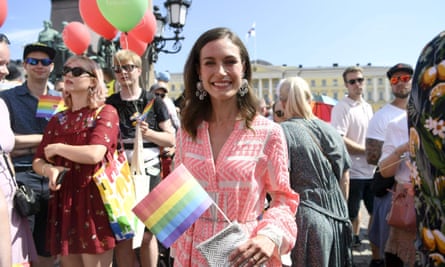The controversy embroiling Finnish prime minister Sanna Marin’s partying scandal threatens to derail what has appeared until now to be a charmed political career.
Marin, who when she became prime minister aged 34 was the world’s youngest elected leader, is a career politician whose rise through the ranks of Finland’s centre-left Social Democratic party appeared effortless.
At the age of 27, she headed up the city council of Tampere, the nation’s third biggest city, winning admiration after a video of her no-nonsense stewardship of a surreal 10-hour debate about a high-speed tram proposal went viral. (After torturous discussion, the tram project eventually passed.)
When former prime minister Antti Rinne resigned in December 2019 over his handling of postal worker strikes, Marin, then minister of transport and communications, stepped into the top job. International attention inevitably followed: Marin helmed a five-party coalition in which every leader was female, and most aged under 40.
The social media savvy Marin was seen as a necessary breath of fresh air for her party, attracting a much-needed younger voter base who could relate to Marin’s breastfeeding selfies, or the modest millennial-style flat she shared with her husband, Markus Räikkönen, prior to becoming prime minister.
An efficient, competent administrator who lacks the wild charisma of a Clinton or a Blair, Marin prefers an unshowy, evidence-based approach to decision-making.
She proved adroit at managing the complicated intra-party relationships required of Finland’s coalition politics, leading her coalition to agree a new budget in April 2021 after tense negotiations.
She has won praise for her swift, decisive leadership during the Covid-19 pandemic, and more recently she secured Finland’s entrance to Nato, to the relief of many within the country who feared Russia’s territorial ambitions might extend to its border.
On the left of her party, Marin is passionate about environmental issues and women’s rights. She has pledged that Finland will be net zero by 2035, and improved the nation’s already generous parental leave system for both mothers and fathers. After the birth of her daughter Emma in 2018, Marin and Räikkönen split their parental leave equally, and she has spoken about why she felt it was so important that both spent time at home.
In person, Marin is composed, well prepared and sometimes stiff, always on top of her briefs and seldom prone to embarrassing gaffes. She is known to personally provide journalists with briefing documents outlining their key areas of interest during interviews, and wait for them to read it.
This work ethic stems from childhood: Marin’s parents separated when she was a child, and money was tight. She worked in a bakery to supplement her mother’s income, and later as a cashier to put herself through university.
When Marin graduated, she was the first member of her family to receive a degree. She is also a proud supporter of LGBTQ rights: after separating from her father, her mother was in a same-sex relationship.

Ironically, it is a side of Marin rarely seen in public – sociable, freewheeling and relaxed – that is now threatening to undo the PM.
In December 2021, she apologised for visiting a Helsinki nightclub with friends after being exposed to Covid-19: she had gone out without her official phone and did not get a message telling her to isolate until after she returned home.
This week, Marin took a drugs test (which came back negative) after footage emerged of her dancing and drinking with friends at a private party, and later at a Helsinki nightclub with a group of musicians, models and social media influencers.
Marin initially defended her right to socialise outside work hours, stating she had drunk only moderately and was at her desk the following morning. But she later apologised after photographs of her friends posing topless at her official residence leaked online.
after newsletter promotion
Her supporters argue that the attacks on Marin are fuelled by misogyny, and indeed it is true that sexism has dogged Marin’s government from the off.
At Davos in 2020, shortly after she was installed as leader, a panel moderator asked Marin how her government worked, leading to her polite, but bewildered response: “[It works] like any government. We don’t meet in a female locker room and have locker-room talk.”
Later that year, Marin was criticised for going braless under a black blazer for a magazine photoshoot.
Critics point out that Marin seems to keep poor company, and wonder whether the prime minister might be being used by those seeking to boost their profile in the media.
They also question the wisdom of allowing herself to be filmed partying by people she, on reflection, could not trust. The timing is inopportune: Marin’s party is trailing the centre-right National Coalition party in the polls, and it looks probable that she will no longer be prime minister come the 2023 general election.

But Marin has also been met by a groundswell of support, particularly from Finnish women, who have shared videos of themselves partying in support of their beleaguered PM under the hashtag #solidaritywithsanna.
The partying controversy goes to the heart of what makes Marin such an appealing, but occasionally divisive, leader. After becoming PM, Marin announced that she had no intention of becoming a staid machine politician.
Initially she continued living in her private flat and shopping at the local supermarket. (She was forced to move into her official residence, Kesäranta, to better manage the Covid response.)
And it is this self-same insistence on authenticity that has driven Marin’s desire to maintain a normal social life, to her credit and occasional peril.
In a 2020 interview with British Vogue, Marin stated that she “just want[s] to be honest, and be myself. I find it much easier.”
It may be that others have to get to grips with the idea that world leaders can be regular people, too.









